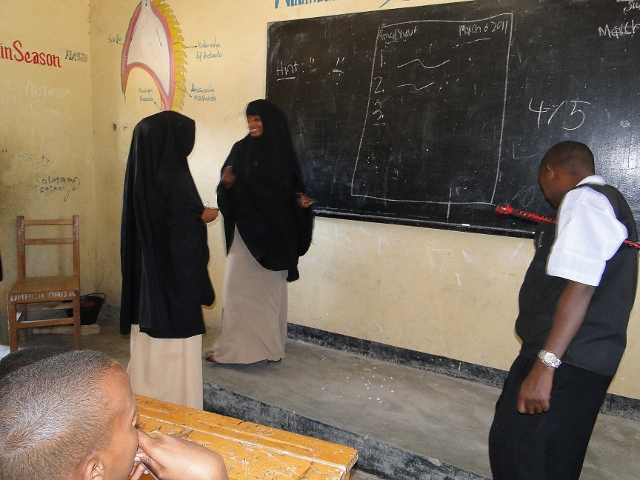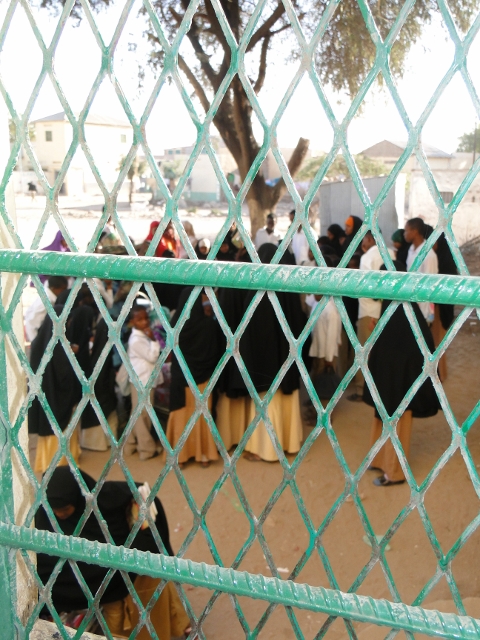In my grade five classes, the students enjoy having competitions between the boys and the girls. The competition consists of two people standing in front of the class and having a conversation in English. The person who speaks the best English (for example, speaks in complete sentences), wins the round.
Wednesday, March 30, 2011
Tuesday, March 29, 2011
School Life
My sister sent over school supplies from Dubai, including coloring books and crayons, pens and pencils, sharpeners, etc. I distribute donated school supplies to the best students in each of my classes.
The following pictures are from a competition between the grade five classes: 5A, 5B, and 5C. The students from each class were asked a series of questions related to the diin (religion). In the end, 5C won the competition.

The prizes for the winning class include Fanta drinks and sweets.
A group of disruptive boys being punished; they must stay in uncomfortable positions in the hot sun.
In the middle of my lesson, the Malmulaa interrupted to hold a draw for computer classes at a nearby school (take note of his choice of weapon). He was only able to choose a few girls and boys from each class, so he crumbled up a few pieces of paper into small balls, threw them on the ground, and asked the students to pick the colored one.

When students are late for school, they are locked outside and you can hear them pleading through the windows of the staff room. They usually linger around the outside of the school because they're fearful of going home and telling their parents they were late for school.

This is Abdirahman, the math teacher at Maalim Dawud. At less than 20 years old, he's almost completed high school and owns a private institute where he teaches English in the afternoon.


When students are late for school, they are locked outside and you can hear them pleading through the windows of the staff room. They usually linger around the outside of the school because they're fearful of going home and telling their parents they were late for school.

This is Abdirahman, the math teacher at Maalim Dawud. At less than 20 years old, he's almost completed high school and owns a private institute where he teaches English in the afternoon.

Sunday, March 27, 2011
Back on Track
Over the past week, I experienced a particularly tough period during which I seriously reconsidered my goals and ambitions in Hargeisa. However, for fear of discouraging the diaspora community of giving back to their homeland, I have chosen not to discuss this experience in detail on my blog.
Instead, I choose to adopt a more positive perspective and share the aftermath and the healing process. My cousin Sagal, along with my nieces and nephew, went for a hike on a nearby hill (one of the hills pictured in an earlier post). By the time we reached the top, we were fortunate enough to enjoy the beautiful landscape in the sunset.
On the climb down, feeling exhilirated and refreshed, I gained new perspective. Prior to embarking on this voyage, a close friend told me about a verse in the Qu'ran that says life's challenges reveal your true intentions. After the past week, that could not be more true.
Instead, I choose to adopt a more positive perspective and share the aftermath and the healing process. My cousin Sagal, along with my nieces and nephew, went for a hike on a nearby hill (one of the hills pictured in an earlier post). By the time we reached the top, we were fortunate enough to enjoy the beautiful landscape in the sunset.
On the climb down, feeling exhilirated and refreshed, I gained new perspective. Prior to embarking on this voyage, a close friend told me about a verse in the Qu'ran that says life's challenges reveal your true intentions. After the past week, that could not be more true.
Wednesday, March 23, 2011
Rest in Peace
A few nights ago, my Mother's Adeero (paternal Uncle) passed away. Although I've been to a few geeri (funerals) in Ottawa, I was unprepared and thoroughly surprised at the events that took place the day after his death. Once news spread, several men came to the house to sleepover and protect the mayd (deceased body). Several women also slept over the same night. In the morning, the body was taken away from the house and burried, a ceremony only men are allowed to attend. The women stayed at the house and prepared an elaborate traditional Somali meal.
First, goats were slaughtered in an Islamic procedure (you must say bismillah before slaughtering the animal and draining its blood). Second, the women go to the market to purchase the ingredients, in huge quantities, for the meal. While the meal was being prepared, I sat on a mat with elder women and listened to their stories while drinking tea.
After the men returned from Duhur prayer at the local mosque, the food was served. After everyone was done eating, the women began the task of cleaning up the house, the dishes, and the front yard. In the afternoon, everyone ate popcorn and traditional Somali sweets.
The elder women skinning the goat.
Water is a precious resource in Hargeisa. For many houses, the water company turns on the taps every few nights, in the middle of the night, for a few hours. The families then use these huge containers, as well as smaller containers used for gas, to store the water.
Women use immense pails, pots and spoons to prepare the feast.
The dishwashing corner (I kept my distance).
These are the intestines and other removed insides of the slaughtered goats.
Here are the men exiting the room where my Mom's Uncle passed away. They are leaving to attend the noon prayer.
These women are making special ingredients used for tea.
The tea corner.
The women prayed inside the home and in the front yard.
The men coming back from prayer.
The men are fed first.
The children are fed second.
The women are fed last.
Subscribe to:
Comments (Atom)





























.jpg)

.jpg)
.jpg)
.jpg)
.jpg)
.jpg)
.jpg)
.jpg)
.jpg)
.jpg)
.jpg)
.jpg)

.jpg)

.jpg)
.jpg)
.jpg)

.jpg)

.jpg)

.jpg)
.jpg)
.jpg)

.jpg)

.jpg)
.jpg)

.jpg)
.jpg)
.jpg)
.jpg)
.jpg)
.jpg)
.jpg)


.jpg)
.jpg)

.jpg)
.jpg)
.jpg)
.jpg)
.jpg)